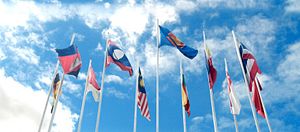South Korea has been supportive of the ASEAN Defense Ministers’ Meeting Plus (ADMM Plus), but has limited expectations for its ability to address the key security challenge facing the Korean Peninsula, namely the North Korean nuclear problem. The reasons for this include the lack of hard security cooperation, the focus on non-traditional security issues, and a preference for bilateral cooperation with the United States in dealing with North Korea. More generally, multilateral cooperation in the field of security and defense is not a priority for the Korean Ministry of National Defense. However, the ADMM Plus will become more important for South Korea for the following three reasons.
An Emerging Security Community
The ADMM Plus, celebrating its 10th anniversary next year, is establishing itself as the main regional body for security and defense cooperation. The ASEAN Regional Forum (ARF), created in 1994, was originally envisioned to address issues of regional security. However, the ARF is proving unable to move beyond confidence building to preventive diplomacy and is looking unlikely to reach its ultimate objective of conflict resolution.
Compared to the ARF, the ADMM Plus is nimbler and more practical. It has fewer members (18 compared to the ARF’s 27), all more geographically clustered around the Asia-Pacific region. Areas of cooperation are specific, with new topics set up when there is a shared need to do so. For example, cooperation on humanitarian mine action was established in 2013 and cyber security was added to the list in 2016. This incremental expansion of subject areas means that the ADMM Plus is able to stay up to date with newly emerging threats and allows for a functional operation based on need rather than broad objectives.
The ADMM Plus has also proven to be more resilient than previously thought. The failure to adopt a joint statement due to dispute over the South China Sea during the third ADMM Plus suggested that it would be vulnerable to great power politics. However, it has managed to move past gridlock by focusing on practical cooperation, such as joint training exercise in maritime security and humanitarian aid and disaster relief (HADR). This shows that the ADMM Plus is able to put political differences aside when cooperation is needed. If this trajectory continues, the ADMM Plus is likely to emerge as the region’s premier security community.
Deepening ROK-ASEAN Relations
Active participation in the ADMM Plus can deepen South Korea’s relations with ASEAN members as well as show South Korea’s support for ASEAN centrality in the regional framework. By design, engagement in the ADMM Plus encourages coordination among ASEAN members and its dialogue partners. The seven areas of cooperation (humanitarian assistance and disaster relief [HADR]; maritime security; military medicine; counterterrorism; peacekeeping operations; humanitarian mine action; and cyber security) each have an expert working group (EWG) which is co-chaired by one ASEAN member and one dialogue partner. The co-chairs set the direction for the members to address the subject area by facilitating cooperation and sharing expertise.
Running in parallel are numerous meetings at different levels, such as the ASEAN Defense Senior Officials Meeting Plus (ADSOM Plus), conferences for information sharing, workshops, and technical training. These criss-crossing platforms offer many opportunities for different countries’ personnel to meet, which, in the longer term, is essential to cultivate a sense of regional community.
This also complements South Korean President Moon Jae-in’s move to elevate ROK-ASEAN relations to a higher level. Ultimately, such efforts support the Moon administration’s New Southern Policy (NSP), which aims to deepen relations with Southeast Asian countries and India by building a community of people, prosperity, and peace. Specifically, promotion of “peace” includes holding more meetings with leaders in the region and deepening military and defence cooperation. Active participation in ADMM Plus activities can help realize this objective.
Venue for Bilateral and Minilateral Dialogue
Lastly, the ADMM Plus is a useful venue for bilateral and minilateral talks among high level officials. Sideline meetings during large multilateral forums are essential to exchange views, push the dialogue forward, or simply to maintain rapport. At the fourth and fifth ADMM Plus, the Korean defense ministers took part in three-way meetings with U.S. and Japanese counterparts to discuss the North Korea nuclear issue. At the third ADMM Plus, Korean and Chinese defense ministers agreed to open navy and military hotlines; additional hotlines between the two air forces were agreed at the fifth ADMM Plus.
Last week, Japanese Defense Minister Taro Kono stated that he is open to meeting his Korean counterpart Jeong Kyeong-doo at the ADMM Plus in Bangkok next month. ROK-Japan military relations have had a difficult year, from the radar lock-on incident to the scheduled termination of the General Security of Military Information Agreement (GSOMIA) next month. Although it is unlikely that a meeting between Kono and Jeong at the ADMM Plus will lead to a dramatic breakthrough, a successful sideline meeting would at least signal intentions of good will and commitment to dialogue.
Ultimately, these three aspects are linked to South Korea’s main security concern: North Korea. Participation in ADMM Plus activities create a norm of addressing security threats collectively. It strengthens interoperability among members’ militaries and creates a strong channel of communication, all crucial in preparing for crisis situations. Closer military and defense ties between South Korea and its regional neighbors will be noted by North Korea and could discourage it from aggressive behavior or encourage it to seek dialogue with ASEAN. Either way would be desirable for South Korea.
Saeme Kim is a PhD candidate at King’s College London. Her research interests include Asian regionalism, regional architecture, and middle power diplomacy.

































